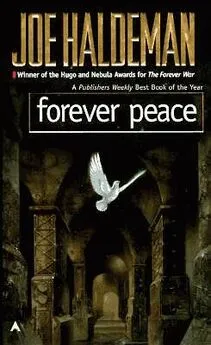Joe Haldeman - Forever Peace
- Название:Forever Peace
- Автор:
- Жанр:
- Издательство:неизвестно
- Год:неизвестен
- ISBN:нет данных
- Рейтинг:
- Избранное:Добавить в избранное
-
Отзывы:
-
Ваша оценка:
Joe Haldeman - Forever Peace краткое содержание
Copyright © Joe Haldeman 1997
Version 1.0
1998 Hugo Award Winner
1999 Nebula Award Winner
This novel is for two editors: John W. Campbell, who rejected a story because he thought it was absurd to write about American women who fight and die in combat, and Ben Bova, who didn't.
Caveat lector: This book is not a continuation of my 1975 novel The Forever War. From the author's point of view it is a kind of sequel, though, examining some of that novel's problems from an angle that didn't exist twenty years ago.
Forever Peace - читать онлайн бесплатно полную версию (весь текст целиком)
Интервал:
Закладка:
Julian was downstairs. She buzzed him up and showed him the message. "I think we might want to make ourselves scarce," he said. "If Macro finds out about it before he leaves the office, he'll call us up. Just as soon wait till Monday."
"Coward," she said. "Me, too. Why don't we go out to the Saturday Night Special early? We could kill some time at the gene zoo."
The gene zoo was the Museum of Genetic Experimentation, a place that was regularly closed by animal rights groups and reopened by lawyers. Ostensibly, the privately owned museum was a showcase for groundbreaking technology in genetic manipulation. Actually, it was a freak show, one of the most popular entertainments in Texas.
It was only a ten-minute walk from the Saturday Night Special, but they hadn't been there since the last time it was reopened. There were lots of new exhibits.
Some of the preserved specimens were fascinating, but the real attraction was the live ones, the actual zoo. They had somehow managed to contrive a snake with twelve legs. But they couldn't teach it how to walk. It would step forward with all six pairs at once, and lurch in one rippling flop after another-not a conspicuous advance over slithering. Amelia pointed out that the legs' connection to the animal's nervous system must be the same as goes to a normal snake's ribs, which undulate together to make it move.
The value of a more mobile snake might be questionable, and the poor creature obviously was made just as a curiosity, but another new one did have a practical application, besides scaring children: a spider the size of a pillow that spun a thick strong web back and forth on a frame, like a living loom. The resulting cloth, or mat, had surgical applications.
There was a pygmy cow, less than a meter tall, that wasn't touted as having any practical purpose. Julian suggested that it could answer the dairy needs of people like them, who liked cream in their coffee, if you could figure out how to milk it. It didn't move like a cow, though; it waddled around with earnest curiosity, probably gene-jumped with a beagle.
TO SAVE CREDITS AND money, we went to the zoo snack machines for some bread and cheese. There was a covered area behind the place with picnic tables, new since the last time we'd been there. We got a table to ourselves in the afternoon heat.
"So how much do we say to the gang?" I said, slicing cheddar in crumbling chunks with a plastic knife. I had my puttyknife but it would make a raclette out of the stuff, or a bomb.
"About you? Or the Project?"
"You haven't been there since I was in the hospital?" She shook her head. "Let's not bring it up. I meant should we talk about Peter's findings; our findings."
"No reason not to. It'll be common knowledge tomorrow."
I stacked an uneven pile of cheese on a slab of dark bread and passed it to her on a napkin. "Rather talk about that than me."
"People will know. Marty, for sure."
"I'll talk to Marty. If I have a chance."
"I think maybe the end of the universe might upstage you, anyhow."
"It does put things into perspective."
The half-mile walk to the Saturday Night Special was hot and dusty, even with the sun setting; a chalky kind of dust. We were glad to step into the air-conditioning. Marty and Belda were there, sharing a plate of appetizers. "Julian. How are you?" Marty said with careful neutrality.
"All right now. Talk about it later?" He nodded. Belda said nothing, concentrating on dissecting a shrimp. "Anything new on the project with Ray? The empathy thing."
"Quite a bit of new data, actually, though Ray's more up to date on it. That terrible thing with the children, Iberia?"
"Liberia," I said.
"Three of the people we were studying witnessed that. It was hard on them."
"Hard on everybody. The children, especially."
"Monsters," Belda said, looking up. "You know I'm not political, and I'm not maternal, either. But what could have been in their minds, to think that something so terrible could help their cause?"
"It's not just a warrior mentality," Amelia said. "Doing that to your own people."
"Most of the Ngumi thinks we did it," Marty said, "and just manipulated things to make it look like they did... as you say, no one would do that to their own people. That's proof enough right there."
"You think it was all a cynical plan?" Amelia said. "I can't imagine."
"No, the word we have-this is confidential and unsupported-is that it was one lunatic officer and a few followers. They're all disposed of now, and Ngumi Psychops, such as they are, are doing a lot of smoke and mirrors, proving that for some reason we would want to destroy a school full of innocent children, to make a point. To show how ruthless the Ngumi are, when of course everyone knows they're the army of and for the people."
"And they're buying it?" I asked.
"A lot of Central and South America is. You haven't been watching the news?"
"Off and on. What was the thing with Amnesty International?"
"Oh, the army let one of their lawyers jack into any string he wanted, on condition of confidentiality. He could testify that everyone was genuinely surprised by the atrocity, most people horrified. That's pretty much gotten us off the hook in Europe, and even Africa and Asia. Didn't make the news down south."
Asher and Reza came in together. "Hey, welcome back, you two. Run off and get married?"
"Ran off," Amelia said quickly, "but to work. We've been up in Washington."
"Government business?" Asher said.
"No. But it will be, after the weekend."
"Can we wheedle it out of you? Or is it too technical?"
"Not technical, not the most important part." She turned to Marty. "Is Ray coming?"
"No; he had a family thing."
"Okay. Let's get our drinks. Julian and I have a story to tell."
Once the waiter had delivered the wine and coffee and whiskey and disappeared, Amelia started the tale, the threat of absolute intergalactic doom. I added a few details here and there. Nobody interrupted.
Then there was a long pause. There had probably not been that many consecutive seconds of silence in all the years this group had been getting together.
Asher cleared his throat. "Of course the jury's not in yet. Literally."
"That's true," Amelia said. "But the fact that Julian and Peter got the same results-down to eight significant figures! – using two different starting points and two independent methods ... well, I'm not worried about the jury. I'm just worried about the politics of shutting down such a huge project. And a little worried about where I'll be working next year. Next week."
"Ah," Belda said. "You've done a good job with the trees. Surely you've thought about the forest as well."
"That it's a weapon?" I said, and Belda nodded slowly. "Yes. It's the ultimate doomsday weapon. It has to be dismantled."
"But the forest is bigger than that," Belda said, and sipped her coffee. "Suppose you don't just dismantle it-you destroy it without a trace. You go through the literature and erase every line that relates to the Jupiter Project. And then you have government goons go out and kill everyone who's ever heard of it. What happens then?"
"You tell me," I said. "You're going to."
"The obvious. In ten years, or a hundred, or a million, somebody else will come up with the idea. And they'll be squashed, too. But then in another ten or a million years, somebody else will come up with it. Sooner or later, somebody will threaten to use it. Or not even threaten. Just do it. Because they hate the world enough they want everything to die."
There was another long silence. "Well," I said, "that solves one mystery. People wonder where physical law comes from. I mean, supposedly, all the laws governing matter and energy had to be created with the pinprick that began the Diaspora. It seems impossible, or unnecessary."
"So if Belda's right," Amelia said, "physical law was all in place. Twenty billion years ago, someone pushed the 'reset' button."
"And some billions of years before that," Belda said, "someone had done it before. The universe only lasts long enough to evolve creatures like us." She pointed a V of bony fingers at Amelia and me. "People like you two."
Well, it didn't really solve the first-cause mystery; sooner or later there had to be an actual first time.
"I wonder," Reza said. "Surely in all the millions of galaxies there are other races who've made this discovery. Thousands or millions of times. They evidently have all been psychologically incapable of doing it, destroying us all."
"Evolved beyond it," Asher said. "A pity we haven't." He swirled the ice in his whiskey. "If Hitler had had the button in his bunker... or Caligula, Genghis Khan..."
"Hitler only missed the boat by a century," Reza said. "I guess we haven't evolved past the possibility of producing another one."
"And won't," Belda said. "Aggression's a survival characteristic. It put us at the top of the food chain."
"Cooperation did," Amelia corrected. "Aggression doesn't work against a saber-toothed tiger."
"A combination, I'll grant you," Belda said.
"Cooperation and aggression," Marty said. "So a soldierboy platoon is the ultimate expression of human superiority over the beasts."
"You couldn't tell that by some of them," I said. "Some of them seem to have devolved."
"But allow me to keep this on track." Marty steepled his fingers. "Think of it this way. The race against time has begun. Sometime within the next ten or a million years, we have to direct human evolution away from aggressive behavior. In theory, it's not impossible. We've directed the evolution of many other species."
"Some in one generation," Amelia said. "There's a zoo full of them down the road."
"Delightful place," Belda said.
"We could do it in one generation," Marty said quietly. "Less." The others all looked at him.
"Julian," he said, "why don't mechanics stay in soldierboys for more than nine days?"
I shrugged. "Fatigue. Stay in too long and you get sloppy."
"That's what they tell you. That's what they tell everybody. They think it's the truth." He looked around uneasily. They were the only people in the room, but he lowered his voice. "This is secret. Very secret. If Julian were going back to his platoon, I couldn't say it, because then too many people would know. But I can trust everyone here."
"With a military secret?" Reza said.
"Not even the military knows. Ray and I have kept this from them, and it hasn't been easy.
"Up in North Dakota there's a convalescent home with sixteen inmates. There's nothing really wrong with them. They stay there because they know they have to."
"People you and Ray worked on?" I asked.
"Exactly. More than twenty years ago. They're middle-aged now, and know they'll probably have to spend the rest of their lives in seclusion."
"What the hell did you do to them?" Reza said.
"Eight of them stayed jacked into soldierboys for three weeks. The other eight for sixteen days."
"That's all?" I said.
"That's all."
"It drove them crazy?" Amelia asked.
Belda laughed, a rare sound, not happy. "I'll bet not. I'll bet it drove them sane."
"Belda's close," Marty said. "She has this annoying way of being able to read your mind without benefit of electricity.
"What happens is that after a couple of weeks in the soldierboy, you paradoxically can't be a soldier anymore."
"You can't kill?" I said.
"You can't even hurt anybody on purpose, except to save your own life. Or other lives. It permanently changes your way of thinking, of feeling; even after you unjack. You've been inside other people too long, shared their identity. Hurting another person would be as painful as hurting yourself."
Читать дальшеИнтервал:
Закладка:









